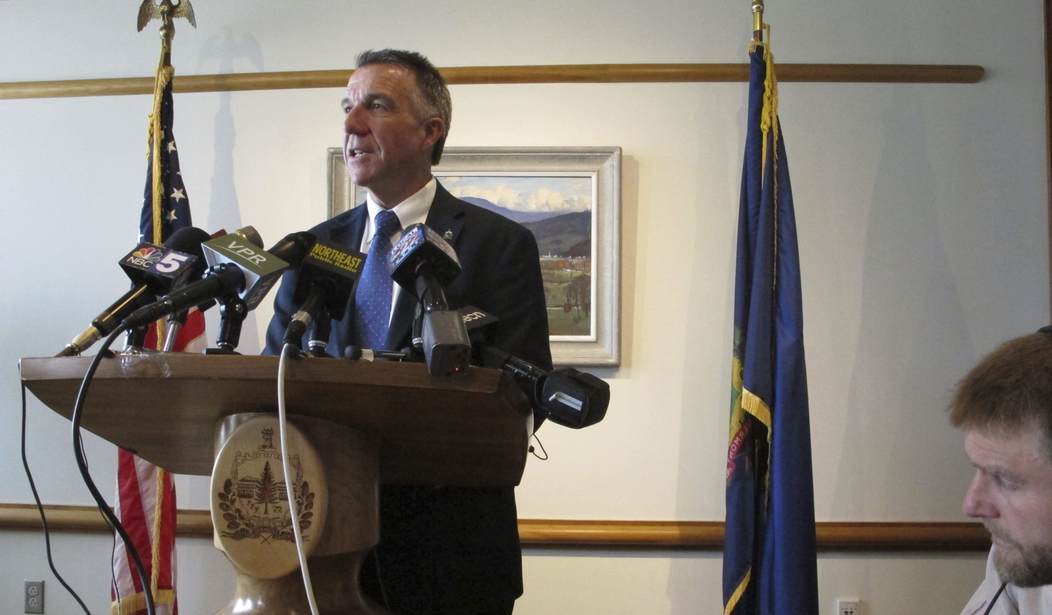As many as 80,000 Vermonters regularly break state and federal law by smoking, eating, or otherwise consuming marijuana. And a 2015 RAND Corporation study showed they spend about $175 million a year with drug dealers for the privilege of doing so.
Vermont lawmakers decided May 10 the state should get its slice of that lucrative marijuana pie and became the first legislative body in America to allow the use of recreational marijuana.
Two weeks later, Gov. Phil Scott (R) followed historical suit. He became the first governor to wreck a legislature’s plans for legalizing pot when he decided May 24 it wouldn’t be in Vermont’s best interest, at least not the way the legislature had written the new law.
However, Scott said he was open to the idea of looking at a revised bill to legalize marijuana in June.
“I believe what adults do behind closed doors and on their own personal property is their choice, so long as it doesn’t negatively impact the health and safety of others,” Scott said.
Legalized recreational marijuana in eight other states was the result of voter-approved ballot proposals. Vermont was the first to do it with a legislative proposal.
The new law would have taken effect in July 2018, if Gov. Scott had not decided to veto the legislation.
In addition to erasing penalties for possession of small amounts of weed, Senate Bill 22 would have also created a study commission to figure out how Vermont should regulate and, of course, tax this new industry.
Scott never liked this bill. Among other things, he was worried about people driving buzzed.
Scott’s concerns are well-founded, according to a Governors Highway Safety Association study in April. It showed that for the first time, drivers killed in traffic accidents nationwide were more likely to be high than drunk.
Colorado, which became the poster state for legalized marijuana three years ago, has seen the number of citations for driving under the influence of marijuana drop by 33.2 percent in the first quarter of 2017 as compared with the first three months of 2016.
But that doesn’t mean there aren’t a lot of people toking up before getting behind the wheel.
“We’re still troubled by the fact that marijuana users are still telling us they routinely drive high,” Colorado Department of Transportation spokesman Sam Cole told the Denver Post.
Cole said a CDOT survey showed 55 percent of people who smoke pot believe it’s safe to drive while high.
“On the issue of legalizing marijuana, the governor has said he is not philosophically opposed, but we must ensure certain public safety and health questions are answered,” Gov. Scott’s spokeswoman Rebecca Kelley told U.S. News & World Report.
There was no question that Vermonters, at least those who were most vocal on the issue, wanted Scott to sign the legislation or at the very least allow it to become law without a veto.
Rep. Thomas Burditt (R) said Scott received “hundreds, if not thousands” of phone calls about the bill, and close to 95 percent of them were from people who supported the legislation.
Kelley said she doubted the accuracy of Burditt’s 95 percent estimate.
Scott is resigned to the fact that legalized marijuana will happen in Vermont. But he also believes the state legislature should take action first to make sure nobody burns a couple of joints before driving.
“It’s no secret that I don’t believe this a priority for Vermont,” Scott said. “I believe that what we should be doing is trying to find ways to protect those on our highways, to deliver a level of impairment that is consistent throughout the northeast, as well as to address the edibles for our kids before we move forward with legalization.”
To begin with, Scott wants the legislature to approve a new law to cover people who drive while high on marijuana.
The Vermont Legislature is looking at a proposal to lower the permissible blood-alcohol content of driver’s blood if the blood test shows they have also been smoking pot. However, Rep. Pat Brennan, chairman of the Vermont House Transportation Committee, told Vermont Public Radio the only test available can determine “the presence” of THC in a person’s blood system but not the “content.”
Gov. Scott also pointed out that as far as he knows, no one has determined yet how much THC — the active ingredient in marijuana — is too much THC for drivers. And, he said, the test to figure that out doesn’t even exist.
“Just like if you have any alcohol it doesn’t mean you’re impaired, so what is the level of THC that causes impairment?” said Scott. “I don’t have the answer to that, I don’t think we have a good way to measure that, and that’s what I am seeking, trying to make sure that we have that in place before we move forward.”







Join the conversation as a VIP Member